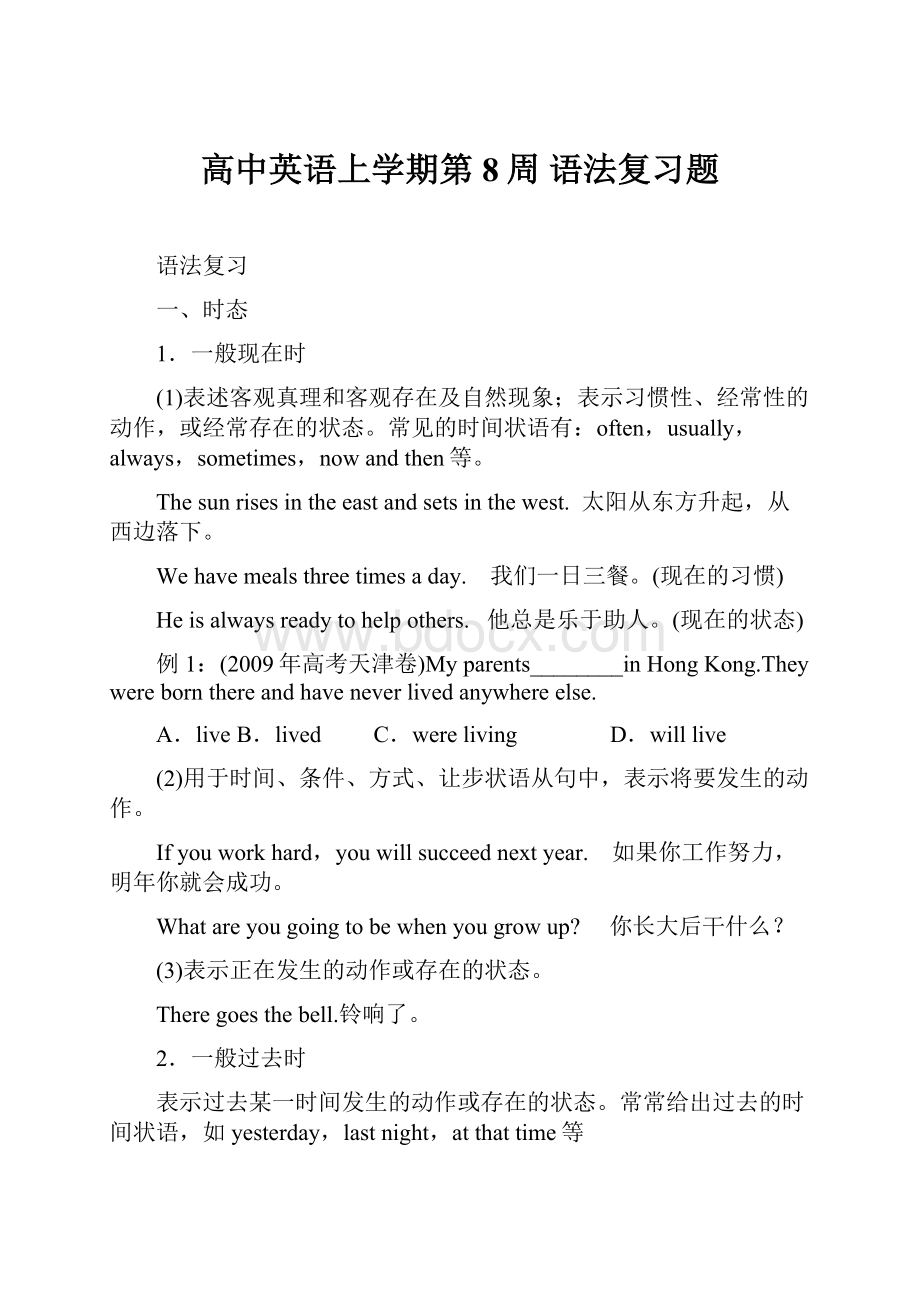高中英语上学期第8周 语法复习题.docx
《高中英语上学期第8周 语法复习题.docx》由会员分享,可在线阅读,更多相关《高中英语上学期第8周 语法复习题.docx(9页珍藏版)》请在冰豆网上搜索。

高中英语上学期第8周语法复习题
语法复习
一、时态
1.一般现在时
(1)表述客观真理和客观存在及自然现象;表示习惯性、经常性的动作,或经常存在的状态。
常见的时间状语有:
often,usually,always,sometimes,nowandthen等。
Thesunrisesintheeastandsetsinthewest. 太阳从东方升起,从西边落下。
Wehavemealsthreetimesaday. 我们一日三餐。
(现在的习惯)
Heisalwaysreadytohelpothers. 他总是乐于助人。
(现在的状态)
例1:
(2009年高考天津卷)Myparents________inHongKong.Theywerebornthereandhaveneverlivedanywhereelse.
A.live B.lived C.wereliving D.willlive
(2)用于时间、条件、方式、让步状语从句中,表示将要发生的动作。
Ifyouworkhard,youwillsucceednextyear. 如果你工作努力,明年你就会成功。
Whatareyougoingtobewhenyougrowup?
你长大后干什么?
(3)表示正在发生的动作或存在的状态。
Theregoesthebell.铃响了。
2.一般过去时
表示过去某一时间发生的动作或存在的状态。
常常给出过去的时间状语,如yesterday,lastnight,atthattime等
例2:
(2009年高考全国卷Ⅰ)Edward,youplaysowell.ButI________youplayedthepiano.
A.didn’tknow B.hadn’tknown C.don’tknow D.haven’tknown
3.一般将来时
(1)begoingto+动词原形,表示打算、计划、准备要做某事。
I’mgoingtolearnJapanesenextyear. 明年我打算学习日语。
(2)be+todo,表示拟定或计划中将发生的行为或按职责、义务必须去做的事情。
Themeetingistobeheldat9∶00a.m.. 会议预定上午九点开始举行。
Youaretohandinyourhomeworkthisafternoon. 今天下午你们必须交上作业。
(3)beabouttodo表示即将发生的事,句中不使用表示将来的时间状语。
Iamabouttogotobedwhenthetelephonerings. 我正要睡觉这时电话铃响了。
(4)用一般现在时或现在进行时表示安排或计划好的将来的行为,只限少数动词,如go,come,leave,start,begin,arrive,return等。
Thetrainleavesthestationat7∶15a.m.. 火车在上午7∶15 开。
Mr.WangisleavingforHangzhoutomorrow. 王先生明天出发去杭州。
(5)begoingto和will比较
①will表示说话人认为、相信、希望或假定要发生的事,不含任何具体时间,可以指遥远的将来,而begoingto指有迹象表明某事即将发生或肯定会发生,通常表示很快就要发生的事情。
IbelieveChinawillbecomeoneoftherichestcountriesintheworld.
我相信在世界上中国将会变成最富有的国家之一。
Thereisgoingtobeaquarrelbetweenthem,Ithink. 我认为他们之间将有一场争吵。
②begoingto和will均可表示“意图”;但事先考虑过的意图用begoingto,不是事先考虑的意图即临时决定用will。
I’mgoingtoQingdaothisweekend. 这个周末我要去青岛。
—Sorry,Iforgottobuythebookyouneed. 对不起,我忘了买你要的书了。
—Itdoesn’tmatter.Iwillgomyself. 没关系,我自己去买就行了。
4.过去将来时
表示就过去某一时间而言,将要发生的动作。
Hesaidhewouldnevercomebackagain. 他说他再也不回来了。
5.现在进行时
(1)表示说话时正在发生着的一个动作;表示现阶段,但不一定是讲话时发生着的动作;表近期特定的安排或计划;go,come等起止动作可用进行时代替将来时。
例3:
(2008年高考重庆卷)Teenagers________theirhealthbecausetheyplaycomputergamestoomuch.
A.havedamaged B.aredamaging C.damaged D.willdamage
(2)表示反复出现或习惯性动作,往往含有赞赏、厌恶、遗憾等情绪,常与always,continually,constantly等连用。
Heisalwaysthinkingofothersfirst. 他总是先想到他人。
Heisalwaysmakingthesamemistake. 他总是犯同一个错误。
6.过去进行时
(1)过去某一时刻正在进行的动作或某一阶段内发生或频繁发生的动作。
HewaswatchingTVat9o’clocklastnight. 昨晚9点钟他正在看电视。
例4:
(2008年高考湖南卷)IcalledHannahmanytimesyesterdayevening,butIcouldn’tgetthrough.Herbrother________onthephoneallthetime!
A.wastalking B.hasbeentalking C.hastalked D.talked
(2)某一动作发生时另一动作正在发生,其中一个在由when或while引导的时间状语从句中。
持续性动作用过去进行时,短暂性动作用一般过去时。
Mybrotherfellwhilehewasridinghisbicycleandhurthimself.
我弟弟骑自行车时从车子上摔了下来,伤了自己。
Asshewasreadingthenewspaper,Grannyfellasleep. 她读着报纸奶奶就睡着了。
ThereportersaidthattheUFOwastravelingeasttowestwhenhesawit.
那位记者说,当他看到时,不明飞行物正在自东向西飞行。
7.现在完成时
(1)表示过去所发生的动作或事情对现在的影响或产生的结果,着眼点在现在。
通常与下列状语连用,如yet,just,before,lately,often,never,now,today等,但不能同特定的过去时间状语连用(in1993,lastyear等)。
I’veforgottenhistelephonenumber. 我忘了他的电话号码了。
(2)表示一个从过去某个时间开始,延续到现在,并可能继续延续下去的动作。
常同表示一段时间的状语连用,如sofar,uptonow,since,forthepast(last)fewyears等。
Hehasworkedhereforovertwentyyears. 他在这里工作已有20多年了。
Uptonow,wehavereceivednonewsfromher. 直到现在,我们还没收到她的消息。
例5:
(2009年高考全国卷Ⅱ)Progress________sofarverygoodandwearesurethattheworkwillbefinishedontime.
A.was B.hadbeen C.hasbeen D.willbe
(3)This/Itisthefirst/secondtime+that从句,that从句谓语要用现在完成时。
ThisisthefirsttimeIhavecomehere. 这是我第一次来这里。
(4)在条件、时间、让步状语从句中,表示将来某时以前已完成的动作。
IwillnotbelieveyouunlessIhaveseenitwithmyowneyes.
只有我亲自看到,我才会相信你的话。
(强调“看完”)
IwillgowithyouassoonasIhavefinishedmywork.
我干完了工作就和你一起去。
(强调“干完”)
8.过去完成时
(1)过去完成时的动作表示过去某一时刻或某一动作之前完成的动作或已经存在的状态。
句中常用by,before,until,when等词引导时间状语。
Bytheendoflastyear,wehadbuiltfivenewhouses. 到去年末,我们已建了五座新房子。
Ihadlearnt5,000wordsbeforeIenteredtheuniversity. 在我上大学前就学了5000个单词。
(2)过去完成时的动词还可表示过去某一时刻之前发生的动作或状态持续到过去某个时间或继续持续下去。
Beforeheslept,hehadworkedfor12hours. 他工作了12个小时才睡觉。
(3)常用于下列情况
①This/Itisthefirst/secondtime+that从句,that从句一般用现在完成时,如果把前边的is改为was,则that从句用过去完成时。
Itwasthethirdtime(that)hehadmadethesamemistake. 这是他第三次犯同样的错误。
②intend,mean,hope,want,plan,suppose,expect,think等动词的过去完成时可用来表示一个本来打算做而实际上没有做的事。
这种用法也可表示过去未曾实现的设想或希望,含有某种惋惜之意。
Ihadintendedtocallonyouyesterday,butsomeonecametoseemejustwhenIwasabouttoleave 我昨天本来要去看你的,但是刚要出门就有人来访。
Ihadmeanttohelpyou,butIwastoobusyatthemoment.
我本想去帮你的,但当时确实太忙了。
Ihadthoughtyouwouldcometomorrow. 我原以为你明天才来呢。
③Hardly/Scarcely/Barelyhad...done...when...;Nosoonerhad...done...than...。
when和than从句里用一般过去时,表示“刚刚……就……”。
Hardly(Nosooner)hadIgothomewhen(than)therainpoureddown. 我刚到家大雨就倾盆而下。
Hardlyhadwestartedwhenthecargotaflattyre. 我们才刚刚动身,汽车的轮胎就漏气了。
9.将来完成时
将来完成时表示到将来某一时间,某一动作将会完成。
常用的时间状语为:
by+将来的某个时间。
Bythistimeofnextyear,allofyouwillhavebegunyourownlife.
到明年的这个时候,你们大家就开始了自己的生活。
10 .现在完成进行时
现在完成进行时表示一个动作开始于过去,并持续到现在,并强调现在还在进行。
完成进行时是完成时和进行时的组合,因此,它具备完成时和进行时的一些因素,如:
它具备进行时的“未完性、暂时性、感情色彩”等的特点。
HehasbeenlearningEnglishfor6years.
他已经学六年英语了。
( 从过去某一时间开始学英语,强调到现在还在学)
Ithasbeenrainingfor3days.
雨已经下三天了。
(强调说话者“抱怨”的感情色彩)
例6:
(2009年高考浙江卷)Overthepastdecades,seaice______intheArcticasaresultofglobalwarming.
A.haddecreased B.decreased C.hasbeendecreasing D.isdecreasing
二、语态
语态有两种:
主动语态和被动语态。
主语是动作的发出者时为主动语态;主语是动作的接受者时为被动语态。
1.get+过去分词表被动
Theygotmarriedlastweek. 他们上周结婚了。
Hegothurtintheaccident. 他在这次事故中受伤了。
2.主动形式表被动意义
(1)系动词look,feel,sound,smell,taste,seem,appear,go,prove,turn等+形容词/名词。
Icefeelscold. 冰摸上去凉。
Hisplanproved(tobe)practical. 他的计划被证明符合实际。
(2)表示开始、结束、运动的词:
begin,finish,start,open,close,stop,shut等。
Classbegins!
开始上课!
Workbeganat7o’clockthismorning. 今天上午七点开始工作。
Theshopclosesat6p.m.everyday. 每天下午6点关店门。
(3)表示主语的某种属性的词:
read,write,act,cut,draw,drive,sell,wash,clean,wear,open,cook,lock,look,shut等。
Thebookssellwell. 这些书畅销。
Thedoorwon’tlock. 门锁不上。
Thiscoatdrieseasily. 这件外衣容易干。
Theplanworkedoutwonderfully. 这计划制定得很好。
Theenginewon’tstart. 引擎发动不起来。
Thepenwritessmoothly. 这只钢笔写起来流利。
例7:
(2010年豫南九校联考)Thenewcollegegraduatehastriedseveralcompanies,buteach timehe________.
A.hasbeenturneddown B.hadbeenturneddownC.wasturneddown D.isturneddown
巩固练习
1.We_____withyouforthetimebeing.
A.willstay B.willbestaying C.wouldstay D.havestayed
2.—Whosingsbestinyourclass?
—Mary_____.
A.Is B.does C.do D.sing
3.She_____herpeninherroomnow.
A.finds B.isfinding C.looksfor D.islookingfor
4.What_____you_____tomorrowmorning?
A.are/goingtodo B.are/doing C.are/done D.have/done
5.Itwasnotlongbeforethewater_____cold.
A.isfeeling B.feels C.felt D.wasfeeling
6.I_____assoonasyoucomeback.
A.wentB.havegoneC.amgoingD.shallgo
7.Thescientist_____Canadaandhewillgiveusatalkwhenhe_____back.
A.hasgoneto/comes B.hasbeento/willcome
C.hasgoneto/willcome D.hasbeento/comes
8.Hefoundhisbookthismorning,butnowhe_____hispen.
A.loses B.ismissing C.haslost D.lost
9.She___toherhometownseveraltimes.
A.hasbeen B.hasgone C.went D.isgoing
10.It_____JaneandMarywhohelpedmetheotherday.
A.is B.was C.are D.were
11.I_____tobedwhenthetelephonerang.
A.havebeen B.went C.amgoing D.wasgoing
12.Jane_____somewashingthistimeyesterday.
A.isdoing B.haddone C.wasdoing D.did
13.WhenIgottotheschool,thefirstclass_____.
A.hadbegun B.began C.isbeginning D.hasbegun
14.Motherpromisedshe_____meanEnglish-Chinesedictionary.
A.isbuying B.willbuy C.wouldbuy D.hasbought
15.Sheobjectsto_____loudmusic_____whileshereadsnewspapers.
A.have/play B.have/played C.having/playing D.have/playing
16.Ifit_____,wewillgotovisitthezoo.
A.notrains B.doesn’train C.won’train D.isn’tgoingtorain
参考答案
复习
单词:
Cancer addictive crime illegal likely powerful bannedaffect recognize
reduced
短语:
berelatedtobreakintobelongtobecome/beaddictedto takeone’sadvice inorderto/soasto giveupdieof/fromsetadatedevelopnewinterests
完成句子:
aremorelikelyto inorderto such;that Whatever helpingotherstostoptakingdrugs
巩固练习:
ADCCCBACDCBADDDC
语法
例题:
AABACCC
巩固练习1—5BBDAC6—10DACAB11—15DCACC16B